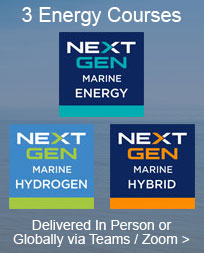Sally Dale - Managing Director, Pinpoint Electronics / Distributor for Sea Machines
Sally found her love of the sea when sailing as a child. She joined the Royal Navy to become an officer of the watch and communications officer. After a short career she became a manager at an RYA sailing school in Cape Town and then a captain and first mate in the super yacht industry before returning to the UK (and dry land) in 2004.
Over the last 11 years Sally has worked for a number of marine electronic companies before establishing Pinpoint in 2015, with the purpose of introducing new and innovative safety systems to the maritime market.
Sea Machines Robotics, founded in 2014, is a forward-looking, autonomous technology company that specialises in advanced control technology for workboats and other commercial surface vessels.
Sea Machines is based in Boston and operates globally. In the UK, Pinpoint Electronics is delighted to represent "one of the freshest tech companies in the maritime sector".
Autonomous Vessels can Improve Safety for Dull Dirty and Dangerous Tasks
Creating vessels and systems that can perform dull, dirty and dangerous tasks has been a driver for many of the autonomous vessels introduced to date around the world. The objective is to improve safety for people at sea by keeping them out of harm’s way, on larger vessels in safe locations or at land based control centres.
Sea Machines have developed unmanned work boats for a number of applications in the maritime and offshore industries. The Autonomous Control Systems (ACS) provide algorithmic supervised autonomous control to enable unmanned operations of a vessel from a local base station or mother ship. The next step is to have unmanned vessels working beyond the line of sight using satellite communications.
For dull tasks the ACS is designed to perform repetitive and quantifiable marine tasks more reliably when compared to direct human control. An analogy for the safety aspects of this type of control system is the advances made by Dynamic Positioning (DP). With DP a skilled master can keep a vessel in position, but it is much easier and more accurate for a computer to do it.
Utilising unmanned vessels for oil spill operations enables remote operators to assist with performance of dirty and dangerous tasks. As these are unplanned marine incidents, the challenge is that you never know where the spill is going to occur. Typically what happens is that local boats and crews of convenience are used, which is not necessarily the most efficient solution. Working surrounded by crude oil is unpleasant, hazardous and can cause health problems. The work also needs to be carried out 24/7 in changing weather conditions.
Download NEXT GEN Workshops April 2019 Presentation (password required)











